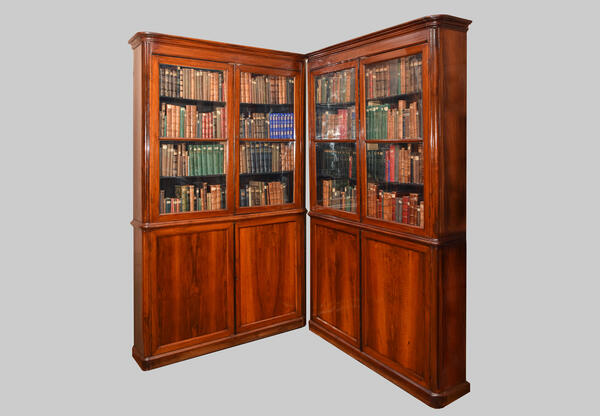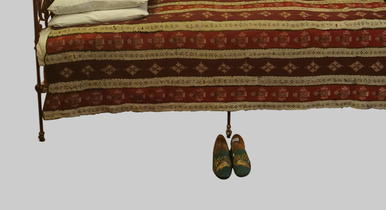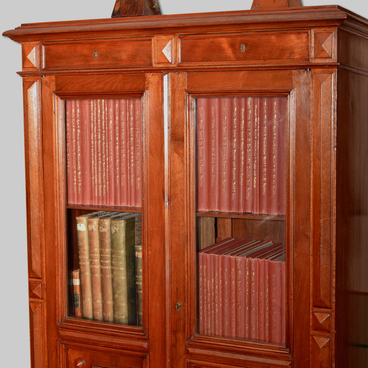Tchaikovsky was an avid reader ever since he was a child. He considered reading ‘one of the greatest joys when it is accompanied by peace of mind and occurs not sporadically, but on a regular basis’. Literature was his source of knowledge and inspiration. Later on, he used many of the stories as the basis for his operas, ballets, and even symphony pieces. Tchaikovsky created 105 romances using the works of famous poets.
The composer’s favorite poet was Alexander Pushkin. However, he only created two romances with Pushkin’s poems. Tchaikovsky said: ‘Pushkin’s poetry is so musical on its own that there is nothing music can add to it’. Instead, the composer used Pushkin’s works as the basis for three of his most famous operas: Eugene Onegin, Mazeppa, and The Queen of Spades.
At the end of the period when Tchaikovsky lived in Moscow, he met Leo Tolstoy whose work he had admired tremendously since youth. Tchaikovsky said: ‘Tolstoy alone is enough not to bow our heads in shame when they tell us about everything that Europe has given to humanity’. Tolstoy was visiting Moscow, and the Moscow Conservatory organized a concert for the writer where Tchaikovsky’s Quartet No. 1 was performed. Tolstoy was so impressed with that piece that it even brought him to tears. The composer was deeply moved and honored, but after getting to know Tolstoy, Tchaikovsky felt disappointed. He did not appreciate the writer’s personal qualities and was disappointed with him as a person, although he continued to admire Tolstoy as a writer.
Tchaikovsky was also acquainted with Alexander Ostrovsky whom he had met at the Moscow Art Club. They soon started working together on the opera The Voyevoda, adapted from Ostrovsky’s play Dream on the Volga. That was Tchaikovsky’s first opera which he later disfavored and destroyed the score.
Tchaikovsky also composed music for Ostrovsky’s play The Snow Maiden, at the request of the theater directorate. He was going to create an opera based on that plot, but Nikolai Rimsky-Korsakov did it first.
Pyotr Tchaikovsky knew many other writers. For instance, he met Anton Chekhov at the end of his life and was one of the first people who saw the talent of the young writer. Chekhov and Tchaikovsky only saw each other twice, but they liked each other a lot after those two meetings. There is a collection of stories, Gloomy People, in the cabinet; Chekhov gifted it to Tchaikovsky, and added a note: “To Pyotr Ilyich Tchaikovsky from the future librettist”. They had plans to collaborate on an opera adapted from Lermontov’s Bela, but they never got a chance to.
Aside from fiction, the cabinets feature many other books covering different fields of science: natural science, religion, history, biology, philosophy. Historical works are especially plentiful. Tchaikovsky was always very keen on history and jokingly called it his ‘second profession’.
The composer’s favorite poet was Alexander Pushkin. However, he only created two romances with Pushkin’s poems. Tchaikovsky said: ‘Pushkin’s poetry is so musical on its own that there is nothing music can add to it’. Instead, the composer used Pushkin’s works as the basis for three of his most famous operas: Eugene Onegin, Mazeppa, and The Queen of Spades.
At the end of the period when Tchaikovsky lived in Moscow, he met Leo Tolstoy whose work he had admired tremendously since youth. Tchaikovsky said: ‘Tolstoy alone is enough not to bow our heads in shame when they tell us about everything that Europe has given to humanity’. Tolstoy was visiting Moscow, and the Moscow Conservatory organized a concert for the writer where Tchaikovsky’s Quartet No. 1 was performed. Tolstoy was so impressed with that piece that it even brought him to tears. The composer was deeply moved and honored, but after getting to know Tolstoy, Tchaikovsky felt disappointed. He did not appreciate the writer’s personal qualities and was disappointed with him as a person, although he continued to admire Tolstoy as a writer.
Tchaikovsky was also acquainted with Alexander Ostrovsky whom he had met at the Moscow Art Club. They soon started working together on the opera The Voyevoda, adapted from Ostrovsky’s play Dream on the Volga. That was Tchaikovsky’s first opera which he later disfavored and destroyed the score.
Tchaikovsky also composed music for Ostrovsky’s play The Snow Maiden, at the request of the theater directorate. He was going to create an opera based on that plot, but Nikolai Rimsky-Korsakov did it first.
Pyotr Tchaikovsky knew many other writers. For instance, he met Anton Chekhov at the end of his life and was one of the first people who saw the talent of the young writer. Chekhov and Tchaikovsky only saw each other twice, but they liked each other a lot after those two meetings. There is a collection of stories, Gloomy People, in the cabinet; Chekhov gifted it to Tchaikovsky, and added a note: “To Pyotr Ilyich Tchaikovsky from the future librettist”. They had plans to collaborate on an opera adapted from Lermontov’s Bela, but they never got a chance to.
Aside from fiction, the cabinets feature many other books covering different fields of science: natural science, religion, history, biology, philosophy. Historical works are especially plentiful. Tchaikovsky was always very keen on history and jokingly called it his ‘second profession’.



